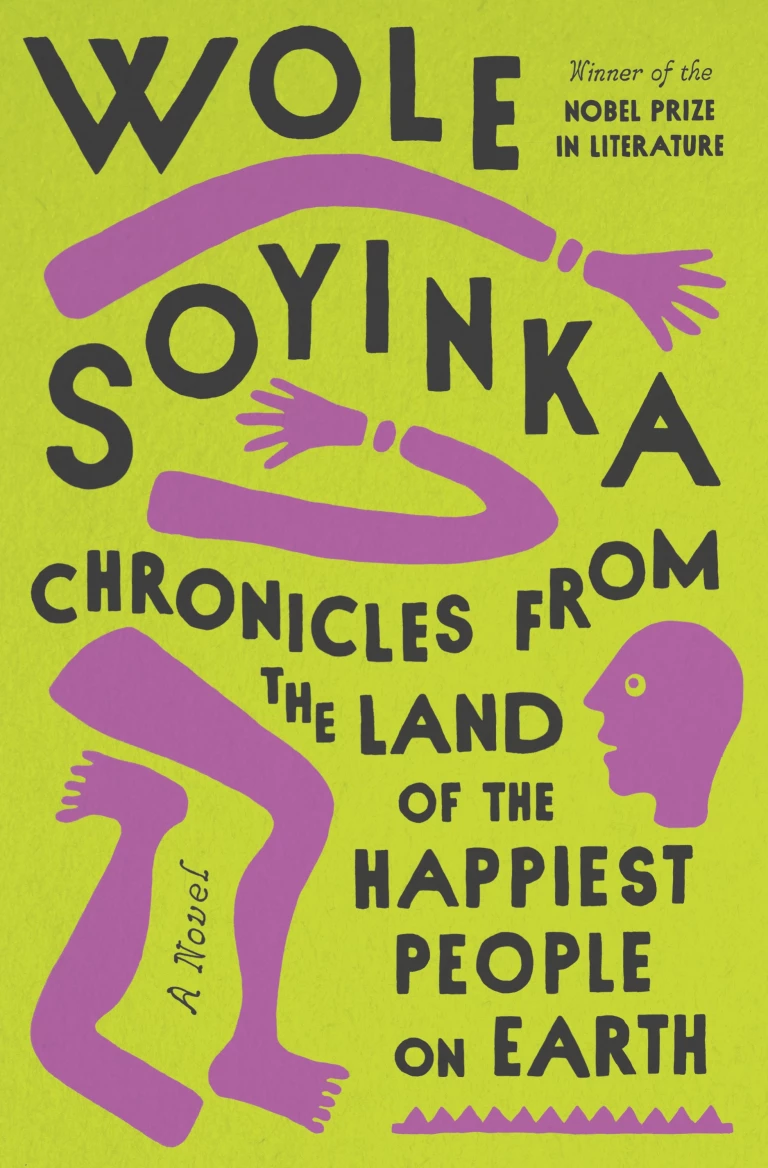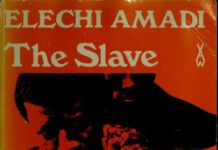In a typical Soyinkaesque prose narration, Chronicles from the Land of the Happiest People on Earth is ringed around four friends who, driven by youthful dreams and exuberance, commit themselves into a social quartet, the Gong of Four, during their studies abroad. They draw a wager on who would first attain national prominence among them.
The novel zooms in on the Gong of Four: Farodion, Badetona, Duyole Pitan-Payne, and Menka, now in their fifties or early sixties. Their dreams to help build a hospital for Menka, the surgeon, in his rocky village had fizzled out with age, maturity and the fast-paced development of Abuja.
The first, Prince Badetona, is obsessed with numbers and works as an auditor. He becomes the safe house for money launderers. He is cajoled by his wife, Jaiyesola Badetona, to visit Papa Davina at his Oke-Kanran prophesite after several bad omens; which include the falling of a lizard on his head and the beheading of a passenger sitting next to him on the very day he decides to take a public transport as an alternative to his broken vehicle.
He goes home from the spiritual site to prepare for arrest for the boxes of money he helps laundered. He is arrested, tortured psychologically with the counting and recalculating of the money recovered from him, and when he is later released, he has lost his mind. Not even the sight of his friend from the Gong of Four, Menka, could revive him from the depth of darkness he has plunged in.
Duyole Pitan-Payne is the scion of the Pitan-Payne family, a family whose legacy is built on their complicity in the African-assisted transatlantic slave trade. He is a boisterous engineer, scrabble prodigy among many other things with a taste for exotic food and music. Duyole establishes his firm, the Millennium Towers, at Badagry where slave trade had thrived only centuries before. He is the brain behind the Brand of the Land and the unifying force and leader of the Gong of Four. He comes to the rescue of his friend, Menka, when the latter’s Hilltop Mansion Club is razed. Duyole attains prominence when he is appointed as a UN official. He meets his death by a mail bomb planted by his son, Damien, just when he realised a human parts business has been operating under his very nose without his knowledge. He wills a considerable part of his properties in fulfilment of Menka’s youthful dream of building a hospital in Gumchi.
Kighare Menka, an acclaimed surgeon, is the third member of the Gong of Four and he is the closest to Duyole with whom he shares his Gumchi dream. Menka is recognised with a National Pre-eminence Award for his meritorious years of stitching victims of the Boko Haram menace. With his fame comes his troubles. He is paid a visit by the dealers in human body parts who want him to join them. But Menka becomes more baffled and infuriated when he sees the precision of how their records are kept and their proper labelling of human parts. His exposure of these activities during the reception of his newly found fame influences the mysterious arson of the Hilltop Mansion, the relocation of the human commodities warehouse, and his joining his friend, Duyole, in Lagos.
He reciprocates the kindness of his friend when the latter is package-bombed in his workshop. He puts all his best to ensure the latter survive the blast. When the latter later died in a Salzburg hospital, Menka objects to Duyole’s siblings’s and father’s (notoriously The Family) decision to bury him on Austrian soil. And when the late man’s will corroborates his position, Menka facilitates his reinterment on the Nigerian soil. In the course of the plot of the novel, he is framed or being framed for the murder of his friend.
Papa Davina, Teribogo, etc. is a religious leader, a modern day advocate of religious pluralism. He serves as a bridge between people of different faiths and he associates himself with all religions. He is an archetype of most modern day preachers who place emphasis on members’ dues and tithing. He is a university dropout and a man of many identities; a very elusive character. It takes the very last chapter of the novel, revelatory, to reveal his ‘true’ identity and connect the dots of incidences in the text; from Badetona’s loss of mind, the approach of Menka by the dealers in human parts, the burning of the club house in Jos, the bombing of Duyole, to the framing of Menka for a crime he knows nothing of – Teribogo is in the heart of this all. He is in fact Farodion, the fourth member of the Gong o’ Four and the outsider who surfaces, disappears, resurfaces and disappears again.
Apart from his ministry, he has an upper class clientele who patronise his side human parts business, a euphemistic “Human Resources” section. He manipulates Duyole’s son, Damien, to operate and track these transactions in human parts from Duyole’s Millennium Towers. A proper image of Teribogo or Farodion is then that of a snake, mephistophelean Nigerian religious leader who also transacts in human parts on the side.
Wole Soyinka’s Chronicles from the Land of the Happiest People on Earth is more of a sequel to his other novels, “The Interpreters” and “Season of Anomy”. The novel satirizes the deceptive antics of politicians and religious leaders, the institutionalisation of human ritual, the corrosive effect of terrorism on the citizenry, the obsessive craving for titles, and the complicity of high-placed individuals in the debasement and veiled ruination and depravation of a country.
This country is understandably Nigeria. There are several references to back this claim. Most of the events in the novel are set in Jos, Abuja, Lokoja, Kaduna, and Lagos – all in Nigeria. At some point in the text, the novelist references the splitting of Ibadan (West Africa’s largest city) technically into divergent kingdoms on the whim of the then sitting governor; an incidence that tallies with the late Abiola Ajimobi’s decision to split Ibadan into smaller kingdoms.
The Boko Haram menace is also a pointer to its Nigerian setting. Punctuated by Farodion’s travels across West Africa which define his chameleonic transformations, Duyole-Pitan’s last sojourn in Salzburg, a few flashbacks, the physical and temporal setting of Soyinka’s Chronicles from the Land of the Happiest People on Earth is reasonably Nigeria in the late 2010s. The country, in contrast to the real life Nigeria, practices the parliamentary system of government where the all powerful Prime Minister, Sir Goldie, commands a lot of “respect and followership”.
Soyinka’s third novel is replete with several themes, addressed to a reasonable extent, such as the commoditisation of the human body parts, ravaging terrorism, lawlessness, murder, dream, hope, greed, deceit, manipulation, penchant for festivities, ‘colonial mentality’ and hypocrisy. Chronicles from the Land of the Happiest People on Earth portrays Nigeria for what she is; a nation of boisterous people held in captivity and perpetual inertness by a numbered few.
The Characters of Duyole Pitan-Payne, Shekere Garuba, and Menka
Three characters caught my attention in the novel: Duyole Pitan-Payne, Shekere Garuba, and Menka. I tried to imagine what Soyinka must have put together in the making of these characters.
The Making of Duyole Pitan-Payne
Duyole Pitan-Payne, the lively and innovative engineer, seems to have similar antecedents in Wole Soyinka’s life. Soyinka’s friend, the great Femi Johnson, is the one person Soyinka moulded Duyole Pitan-Payne after. Femi, like Duyole, was lively, supportive; had sweet tooth; and meant everything to Soyinka. The business colossus was flown outside the country for medical treatment and returned to the country dead. Like Duyole, his burial generated controversies. Soyinka said this much in his memoir, You must Set Forth at Dawn.
Duyole Pitan-Payne’s controversial death also fits in with Dele Giwa’s gruesome murder. Dele Giwa was killed by a letter bomb just the same way Duyole met his end by what was supposed to be a Kilishi mail package. Dele Giwa, before his death, was just one step from revealing information that could have implicated a Head of State. Had Duyole been allowed to live, he would have unravelled a crime syndicate that dealt in human body parts, their warehouses and clientele. He would have implicated Papa Davina and even the Prime Minister, Sir Goldie.
Coincidentally, two of the three persons Soyinka dedicated Chronicles from the Land of the Happiest People on Earth to are Femi Johnson and Dele Giwa, the third person being Bola Ige who was politically assassinated.
The Making of Shekere Garuba
Soyinka is undoubtedly one of the fiercest critics that have graced the Nigerian socio-politico-economic landscape. He does not mince words when it comes to calling the government to attention. His criticisms logically attract lashes from government apologists. In one such instance of defending the government, Garba Shehu, a media aide to President Muhammadu Buhari, told Soyinka plainly to face his writing business.
So, Shekere Garuba, a government aide, in Chronicles from the Land of the Happiest People on Earth is identified as a sycophant, a kolanut bowl-bearing fellow for the Prime Minister. Using Duyole’s scrabble mind with which he worked around the cryptic word “median”, I think Soyinka only worked around Garba Shehu’s name to arrive at Shekere Garuba.
In any case, Shekere Garuba is an archetype of political sycophants, government apologists, and hallelujah-crowing government aides who defend the government and praise their superiors even when those ones are taking the country into a bottomless pit.
The Making of Menka
What possibly could have influenced the creation of the character of Menka? There is one answer, one word: Soyinka! Menka is honoured with a National Pre-eminence Award, a doctor laureate just the same way Soyinka was honoured on the global space with the Nobel Laureate.
Menka finds the fame that came with this recognition unsettling but in the long run, he learns to use his influence where there appears to be an impasse. In You must Set Forth at Dawn, in a conversation with Gabriel Garcia Marquez (a Nobel Laureate too), Soyinka mentioned the fame and publicity their Nobel Awards attracted. Soyinka, much like Menka, would put this recognition into good use, for example, when the Nigeria Government seized his international passport, etcetera.
 WHATSAPP: Click HERE to join the new Literature PADI WhatsApp group to receive latest updates on your phone and for further literary discussions!
WHATSAPP: Click HERE to join the new Literature PADI WhatsApp group to receive latest updates on your phone and for further literary discussions!










Profound!
Comments are closed.